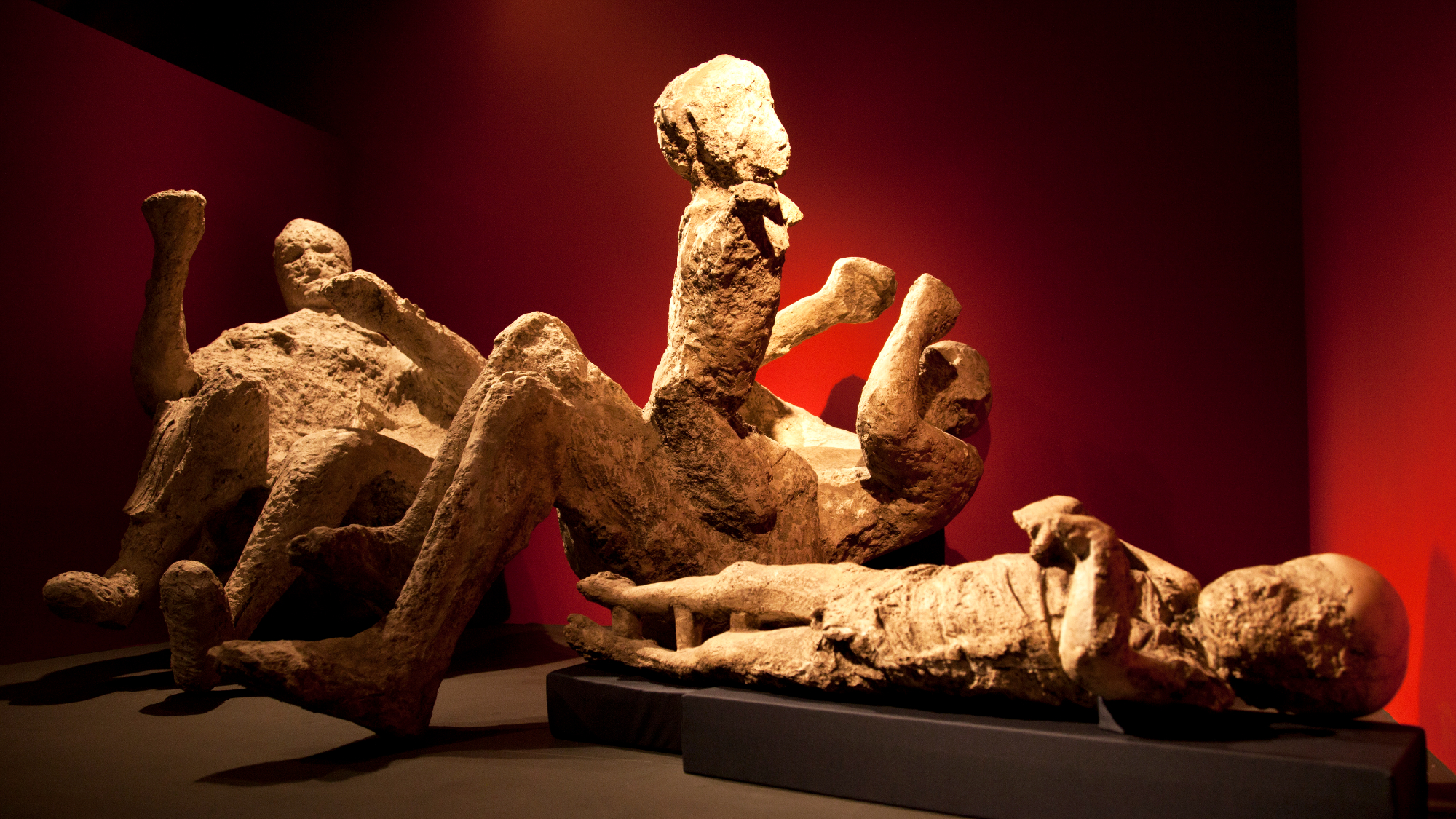New DNA tests of Pompeii dead upend popular stories
An analysis of skeletal remains revealed that some Mount Vesuvius victims have been wrongly identified


A free daily email with the biggest news stories of the day – and the best features from TheWeek.com
You are now subscribed
Your newsletter sign-up was successful
What happened
Plaster casts of calcified Pompeii residents have long been used by archaeologists to tell the stories of the last, desperate moments of ancient Romans before they were buried and preserved in pyroclastic ash from Mount Vesuvius in A.D. 79. But new DNA evidence shows that many of those stories are wrong, researchers reported Thursday in the journal Current Biology.
Who said what
A team of U.S. and European researchers conducted genomic testing on skeletal remains embedded in 14 casts undergoing restoration, including two people embracing and the four-member "Family in the House of the Golden Bracelet." The presumed nuclear family — including a mother wearing the distinctive bracelet, with a child on her lap — turned out to be four unrelated males, the researchers said. At least one of the entwined "Two Maidens," long believed to be sisters or a mother and daughter, was a male, and the pair were not related. Many of the calcified Pompeiians appear to have immigrated, by choice or force, from the eastern Mediterranean or North Africa.
"Sometimes, what you think you see is not what it is," said Harvard geneticist David Reich, one of the leaders of the study. This "new scientific tool" of ancient DNA analysis reminds us "the past is, as the cliché goes, an undiscovered country." Scientifically revealing "the actual lives of the victims" is "much more respectful than just using them as props for storytelling," said Estelle Lazer, an archaeologist who previously used CAT scans and X-rays to analyze the casts, to The Washington Post.
The Week
Escape your echo chamber. Get the facts behind the news, plus analysis from multiple perspectives.

Sign up for The Week's Free Newsletters
From our morning news briefing to a weekly Good News Newsletter, get the best of The Week delivered directly to your inbox.
From our morning news briefing to a weekly Good News Newsletter, get the best of The Week delivered directly to your inbox.
What next?
The new discoveries will help researchers better understand not just Pompeii but also gender and migration in the Roman Empire.
A free daily email with the biggest news stories of the day – and the best features from TheWeek.com
Peter has worked as a news and culture writer and editor at The Week since the site's launch in 2008. He covers politics, world affairs, religion and cultural currents. His journalism career began as a copy editor at a financial newswire and has included editorial positions at The New York Times Magazine, Facts on File, and Oregon State University.
-
 Political cartoons for February 15
Political cartoons for February 15Cartoons Sunday's political cartoons include political ventriloquism, Europe in the middle, and more
-
 The broken water companies failing England and Wales
The broken water companies failing England and WalesExplainer With rising bills, deteriorating river health and a lack of investment, regulators face an uphill battle to stabilise the industry
-
 A thrilling foodie city in northern Japan
A thrilling foodie city in northern JapanThe Week Recommends The food scene here is ‘unspoilt’ and ‘fun’
-
 How roadkill is a surprising boon to scientific research
How roadkill is a surprising boon to scientific researchUnder the radar We can learn from animals without trapping and capturing them
-
 NASA’s lunar rocket is surrounded by safety concerns
NASA’s lunar rocket is surrounded by safety concernsThe Explainer The agency hopes to launch a new mission to the moon in the coming months
-
 The world’s oldest rock art paints a picture of human migration
The world’s oldest rock art paints a picture of human migrationUnder the Radar The art is believed to be over 67,000 years old
-
 Moon dust has earthly elements thanks to a magnetic bridge
Moon dust has earthly elements thanks to a magnetic bridgeUnder the radar The substances could help supply a lunar base
-
 Winter storm lashes much of US South, East Coast
Winter storm lashes much of US South, East CoastSpeed Read The storm spread across 2,000 miles of the country
-
 The ocean is getting more acidic — and harming sharks’ teeth
The ocean is getting more acidic — and harming sharks’ teethUnder the Radar ‘There is a corrosion effect on sharks’ teeth,’ the study’s author said
-
 Cows can use tools, scientists report
Cows can use tools, scientists reportSpeed Read The discovery builds on Jane Goodall’s research from the 1960s
-
 The Iberian Peninsula is rotating clockwise
The Iberian Peninsula is rotating clockwiseUnder the radar We won’t feel it in our lifetime
